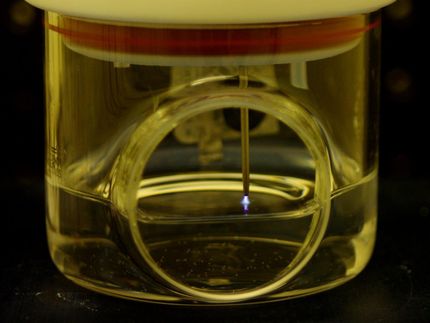Powder power - a simple, efficient route to hydrogen fuel
Advertisement
Chemists in the US have developed a simple reaction to make ammonia borane - a powder more hydrogen-dense than even liquid hydrogen. Their one-pot synthesis of this promising hydrogen storage material is reported in the first issue of the new Royal Society of chemistry journal Energy & Environmental Science.
Hydrogen has significant benefits as a fuel of the future: potentially renewable and sustainable, and, as hydrogen fuel cells emit only water, a green alternative to other more polluting fuels such as hydrocarbons like petrol. Storing hydrogen safely is tricky, however - pressurising hydrogen gas is potentially dangerous for everyday use, and it can only be stored as a liquid under cryogenic conditions.
Chemists like Tom Autrey from Pacific Northwest National Laboratory, US, are addressing the problem by designing materials to store hydrogen safely, such that it can be released at will to power a fuel cell.
Ammonia borane (AB) is a stable white powder which releases hydrogen gas upon heating. Its use as a hydrogen storage material has been hampered by difficulties in making the powder in reasonable yield, but the new research further increases its promise.
Autrey and colleagues discovered a "one-pot" method of making AB while studying its decomposition pathways. He said the group was "pleasantly surprised that under relatively simple reaction conditions the ammonia borane was formed in very high yields."
The group is currently looking at scaling up the reaction to an industrial level. Autrey says the next challenge is to "recycle the solvents to provide the most economical route to synthesise this promising hydrogen storage material."
Original publication: Tom Autrey et al., Energy Environ. Sci., 2008.
Other news from the department science
Most read news
More news from our other portals
See the theme worlds for related content
Topic world Synthesis
Chemical synthesis is at the heart of modern chemistry and enables the targeted production of molecules with specific properties. By combining starting materials in defined reaction conditions, chemists can create a wide range of compounds, from simple molecules to complex active ingredients.

Topic world Synthesis
Chemical synthesis is at the heart of modern chemistry and enables the targeted production of molecules with specific properties. By combining starting materials in defined reaction conditions, chemists can create a wide range of compounds, from simple molecules to complex active ingredients.






















































